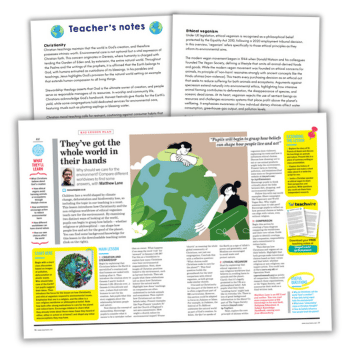PDF lesson plan and teaching notes
KS2
Years 3-6
Why should we care for the environment? Compare different worldviews to find some answers in this KS2 lesson plan from Matthew Lane…
Children face a world shaped by climate change, deforestation and biodiversity loss, so including the topic in our teaching is a must.
This lesson introduces how Christianity and the non-religious worldview of ethical veganism teach care for the environment.
By examining two distinct ways of looking at the world, pupils can begin to grasp how beliefs – whether religious or philosophical – can shape how people live and act for the good of the planet. You can find some background knowledge for this lesson in the downloadable teaching notes.
Learning objectives
- Know what Christians believe about God’s creation
- Learn how ethical vegans avoid harming animals or ecosystems through lifestyle choices
- Think about how worldviews encourage action to reduce environmental harm
- Find out how different worldviews can have shared values
- Think about how our own choices affect the world
Starter activity
Begin with a short class discussion based on images of pollution, deforestation or plastic waste. Who should take care of the Earth? Let pupils suggest their ideas.
Then introduce the focus for the lesson on how Christianity and ethical veganism respond to environmental issues. Emphasise that one is a religion, and the other is a non-religious worldview or philosophical belief.
Note how both offer strong motivations to care for the planet and reduce harm. Encourage children to share what they already know about these views (have they heard of either, either in school or at home?) and dispel any initial misconceptions they may have.
Matthew Lane is an RE lead and author. You can read more comparisons of RE knowledge in his new book, Religious Education: A Subject Knowledge Handbook, coming soon from Bloomsbury. Visit his website at theteachinglane.co.uk

Similar resources
- Poetry prompts with Joseph Coelho – Author In Your Classroom ep 29
- Bring mythology into the modern world with Louie Stowell – Author In Your Classroom ep 28
- Plan an action story with Jason Rohan – Author In Your Classroom ep 27
- Collect ideas for characters with Lisa Thompson – Author In Your Classroom ep 26
- Write modern fairy tales with Konnie Huq – Author In Your Classroom ep 25













